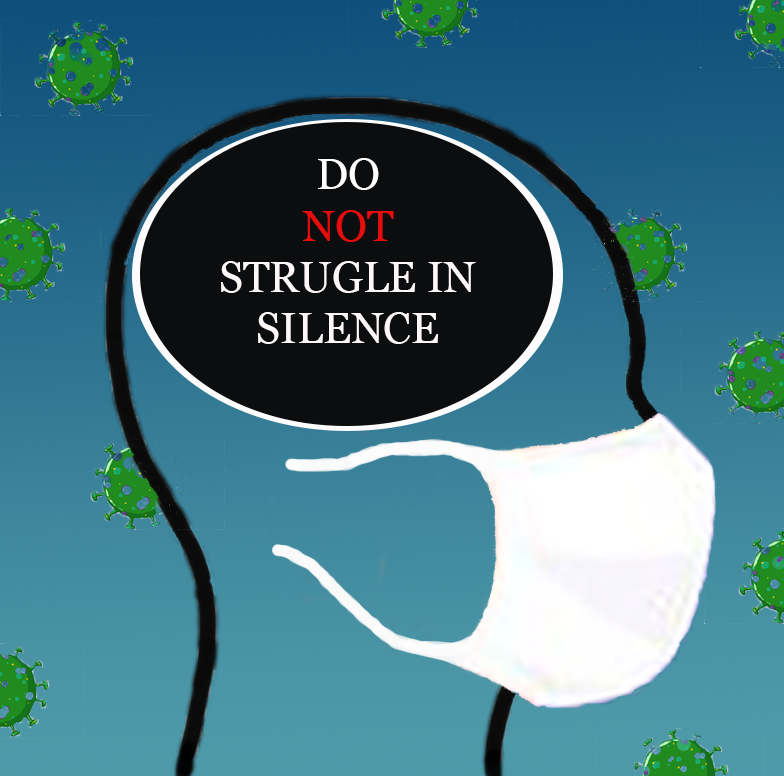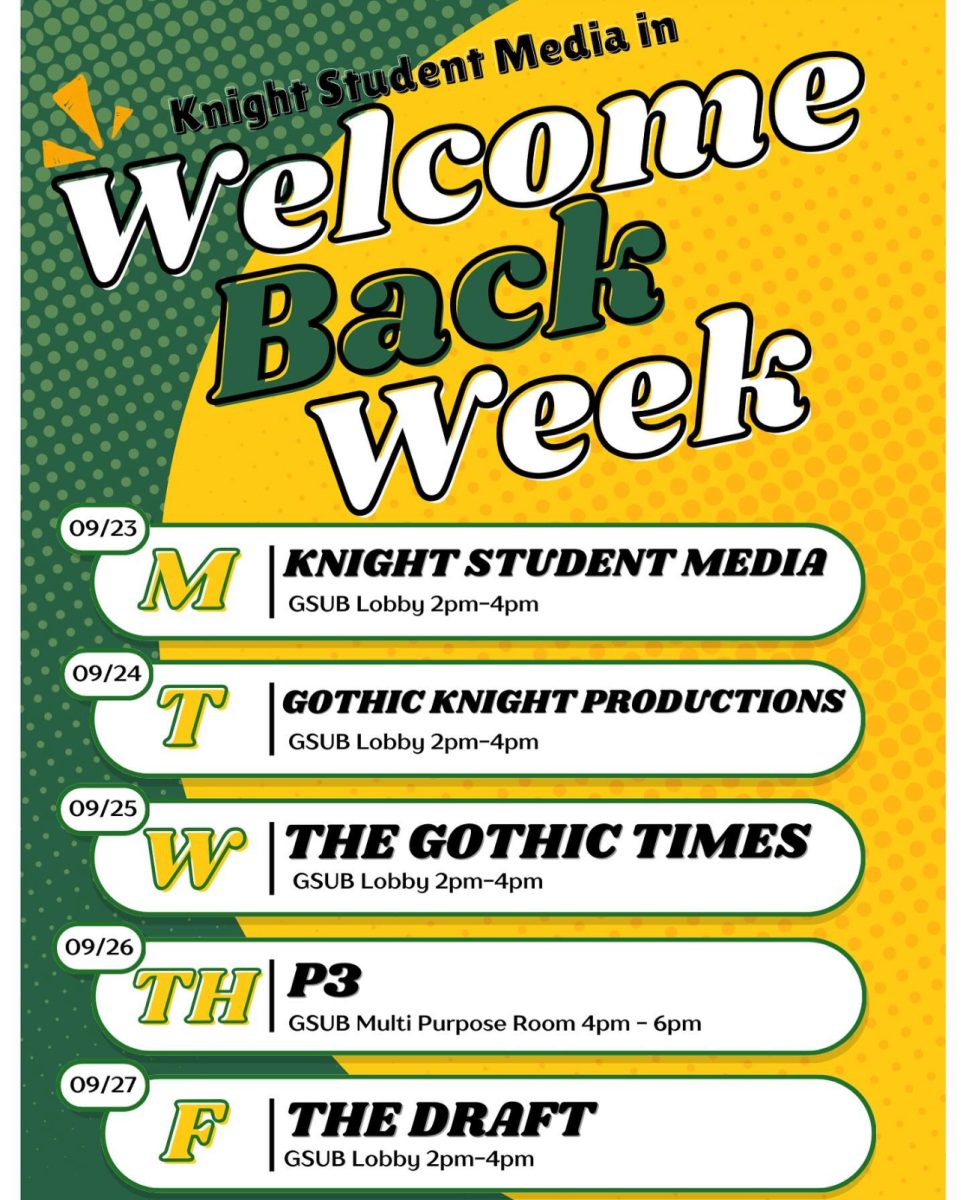Worried About Your Mental Health? So Are Many NJCU Students
Students struggle with their emotional well-being due to COVID-19
June 4, 2020
As Coronavirus cases continued to grow in numbers, mental health concerns have either resurfaced or continuously affected many NJCU students. Students are quarantined in their homes, dealing or struggling with their emotional well-being.
With New Jersey in lockdown for weeks, many students expressed their mental health concerns and how the Coronavirus was affecting their lives and how online classes added, in some cases, to the stress.
In an email interview, Omar Kanaan, an incoming sophomore majoring in Biology, said, “I have always disliked the idea of online classes because I feel it doesn’t meet the criteria of understanding the materials well. The transmission to remote learning was sudden to everybody, and it was a big shock to me. The feeling of sitting in front of my laptop for long hours affected me physically and mentally.”
Kanaan adds that the pandemic worsened his situation with online classes. He says, “Before the crisis, I used to be with my friends, go to the library to study, work on a science project, or chill out, but now we don’t have time to communicate because of lots of work coming through Blackboard every day. It took a little longer to understand the new teaching techniques, whether via Zoom or Blackboard, which made us rush with chapters, so we don’t get left behind.”
Safa Mostafa, a freshman resident at Co-op residence hall and majoring in Political Science, says, “ My mental health wasn’t the best before quarantine because I was going through some health issues but after I felt sooo depressed.”
Mostafa adds, “I’ve been seeing my therapist from NJCU (via zoom) and it’s helped. As for classes they seem to make it be like we’re just working from home when that’s not the case. We’re working during a crisis at home. It affects your mental health tremendously to the point where you’re not capable of doing a 2,000 word essay.”
Afterwards, Mostafa explains her therapy experience at the NJCU Counseling Center . She continues and says, “I believe we need a major upgrade to our [Counseling Center] at NJCU. Prior to the pandemic they weren’t a big help, they only have I believe five therapists working there. Mind you NJCU has 8,000 students. They need an entire floor in order to really help the students.”
During an email interview, Dr. Abisola Gallagher, the director of the Counseling and Wellness Services at NJCU said, “There has always been a significant increase in the demands for our services during the spring semester, but there has been a slight decrease in the demand for service at the semester’s end. Many of our students are dealing with stress and grief related to the Coronavirus experience,” when discussing the effects of COVID-19 on the students.
Dr. Gallagher continues, “At this time we are offering ongoing counseling sessions to current clients and those who have previously utilized the Counseling Center. For all students we are offering brief 25 minute consultations on a daily basis for support. During the spring semester we, also, conducted virtual support groups to members of the Peers Educating Peers Program and for students on the LGBTQIA Spectrum. Additionally, we provide information about off-campus resources available to students, including a number of support groups that can be found on our website.” The website will be linked towards the end of this article and students can contact the Counseling Center at 201-200-3165 or email [email protected] for assistance.
Venida C. Rodman Jenkins, director of the Women’s Center, also has received reports during this time, regarding the emotional well being of NJCU Students. Jenkins said, “There have been reports, and we refer inquiries related to mental health to the NJCU Counseling Center. If they are looking for services in the community, then we make those referrals as well.”
Jenkins adds, “I believe that the impact of mental health is compounded for our students, and the community at large, who are living with their abusers, poor, lack health care, have pre-existing conditions, those with limited access to technology, or the ability to social distance because of living situations, and those who lack resources. Even people who do not fall into any of the above categories are impacted as they live with the daily uncertainty of this pandemic. It’s important for us to do all we can to ensure people are connected to the resources that they need when they need it.”
She further explains that students should not be alone and feel as if they are alone in their fight. Students can call 201-588-5353, in order to receive assistance from the Women’s Center.
Angibel Santana, a NJCU sociology major and sophomore, said,“ My mental health during this pandemic is not okay at all, being quarantined has cancelled many things I was looking forward to, my babyshower, Mother’s Day, my birthday, all these things I’m not able to celebrate the way I normally would. Before the pandemic I was a very happy person, always upbeat, this pandemic has made me a gloomy person. I don’t even know what day it is to be honest with you.” Santana mentions that she has not contacted anyone from NJCU. She believes that, “there isn’t anything they could do to help my situation,”
Mia Pepe, a Psychology major and sophomore, said, “I’d say my mental health has been in a constant state of flux. Before the pandemic, I felt content and average in terms of how I was feeling inside. I think I’m normally distracted by the constant commutes between home and school. Also just being on campus in general. Throughout this pandemic my mental state has been all over the place. Some days I have had enough work to be distracted at home. But it’s hard not to feel isolated and alone at times. Also, the times when my entire family was in the house for the whole day drove it caused some quarrels.”
Pepe further explains that although the pandemic has made her feel lonely, she has found ways to connect to her family and friends. Therefore, it helps to take her mind off the situation at hand. She has not contacted anyone from NJCU as well.
On the other hand, Benjamin Fernandez, an incoming sophomore, majoring in Media Arts, says, “I feel like my mental health is stable and I actually feel better now that I’m staying at home. Before the pandemic, I was feeling more stressed being at school but I feel more alleviated from it.” Fernandez adds that he has not contacted anyone from NJCU in regards to assistance for his mental health.
Checking in with HCCC
In an email interview, Doreen Marie Pontius, the Associate Director of Counseling & Wellness at Hudson County Community College (HCCC), says, “ At Hudson County Community College there has been a significant increase in mental health counseling services needed since Covid-19 for various reasons, such as anxiety, depression, adjusting to the new online platform for classes, and also suffering from family losses or having Covid-19. This has been a difficult time for students.”
Pontius further describes how the Counseling Center has met the needs of students when requesting for services. She says, “Currently, Hudson County Community College staff has created an online referral form called “Care and Concern Form,” which is accessible on the student’s Portal. They can request mental health services… Once the Care and Concern form is complete, it is automatically routed to Associate Director of Counseling & Wellness, Associate Dean of Student Affairs, and Vice President for Student Affairs and Enrollment Services. Within 24 – 48 school hours, the student will be contacted by the Counseling and Wellness Center. The student will be offered an intake date via telehealth / phone session, their choice. Once the intake is completed, a comprehensive plan is developed to address their needs. All HCCC students are eligible for 6 – 12, 45-minute sessions by a licensed Clinical Social Worker.”
Hudson County Community College is also providing resources and advice to share with the students. Pontius explains, “We are also directing students to https://covid19.nj.gov site, as well as the following other support sites: (note these sites are on their Portal – on the Mental Health Counseling page)… We are also updating our social media platforms and our website site with coping tools, mindfulness guides, and support. We are placing reminders on how to stay healthy and emotionally safe. We are also recommending they review some helpful APS: Headspace, Aura, My3: Stop, Breathe, Think, Tapping Solutions, Calm, Safety Plan, Coloring Book, Adult coloring.” Links to the sites mentioned by Doreen Marie Pontius, will appear at the end of the article.
Jersey City Mental Health Services has resources available online. Their website says: “We have changed many of our routines to protect ourselves and each other. Here are some helpful resources to support you, especially as we stay at home. The Jersey City Public Library is offering expanded digital services and JobNow for Jersey City residents experiencing job loss… The JCPL also added VetNow which provides consultation to veterans and their families. JobNow and VetNow are free with a JCFPL library card.” Please refer to JC RESPONDS website link (listed below) for more information on tips and ways to help your mental health.
Stacey Flanagan, director of the Health and Human Services Department in Jersey City says in an email interview, “In our work, we have talked to a number of people in mental and emotional distress, so each of the last three months we have referred more than our normal number of people for additional help, 5-10 per month instead of 1 or two.”
Meanwhile, NJCU students continue to express their concerns throughout the Coronavirus pandemic.
Freshman Monica Ortiz, a Gothic Times writer majoring in Sociology, said, “I’ve struggled with mental health problems since 13 and I’ve had my ups and downs. My mental health has fluctuated during the pandemic. Without going to campus physically or going to work anymore, I’ve sort of lost routine and focus and it’s taken a toll on me mentally. Some days are better than others.”
Similarly, Michi Suazo,, majoring in English and Creative Writing, and class of 2020 graduate said, “I feel like I had more structure and a better grasp of time before the lockdowns started. I worked at city hall as a seasonal employee but I started to lose hours because that was when non-essential workers were urged to stay home.”
Suazo continues, “Many things contributed to it-not having a job anymore, loved ones passing away from sickness due or not due to COVID-19, being in a constant state of hypervigilance with hygiene and sanitations and being careful where I and my family go because we’re Asian. Hate crimes towards asian people skyrocketed during the few days when it started.”
Expanding on Suazo’s previous message, according to CNN, there have been reports from Asian Americans of hate crimes or attacks regarding the outbreak of COVID-19. People used racial slurs and devalued the culture of Asian Americans.
The current situation prohibits people from traveling or going outside for certain occasions. Determining that this can be one of the causes of the emotional state of mind deteriorating, there are ways or tips that can help or improve mental health.
According to Mental Health America (MHA), activities as simple as, yawning and laughing can contribute to having a positive mind. As well as, working out, experimenting with creativity, disconnecting from electronic devices, writing or journaling, etc… These have been proven to work for many individuals. It is about knowing what works for you.
In addition to MHA, HelpGuide provides a supportive guide to understanding the state of mind and how to overcome it. A few of these tips include, joining a networking group, calling and checking on loved ones and acknowledging the stress level there is.
Moreover, Centers for Disease Control and Prevention (CDC) in a COVID-19: “Coping with Stress” article, explains that stress related to the Coronavirus can be taken care of with a few helpful tips that are provided. Taking a break from watching or reading the news can be beneficial for your health and it may reduce your stress level as well. Virtual communication with loved ones is another way to improve your emotional well-being as well as taking care of your body and eating as healthy as possible. All these ways can contribute to positive mental health.
If you or someone you know is in need of mental health hotline services, please check out the resources below and click on the first link. It will lead you to NJ hotlines numbers.
Counseling Center-
New Jersey City University 2039 Kennedy Blvd Jersey City, NJ 07305.
201-200-3165
Speicher-Rubin Women’s Center for Equity and Diversity-
New Jersey City University 2039 Kennedy Blvd Jersey City, NJ 07305.
201-200-3189
Bridgeway Crisis Intervention Services-
152 Central Ave., Jersey City
201-855-2539
Hudson County Mental Health Crisis Hotline-
201-433-6161, 24 hrs. a day
National Suicide Prevention Lifeline-
800-273-8255, 24 hrs. a day
National Hopeline Network-
800-442-4673, 24 hrs. a day
NJ Department of Health Hotlines-
https://www.state.nj.us/health/integratedhealth/hotlines/index.shtml
NJCU Counseling Center- https://www.njcu.edu/student-life/campus-services-resources/counseling-center/counseling-center-services/counseling-services-during-covid-19-pandemic
NJCU Campus Resources-
JC MentalHealth Services-
https://jerseycitynj.gov/CityHall/health/communityhealing
Department of Human Services NJ-
https://nj.gov/humanservices/news/pressreleases/2020/approved/20200323b.html
Mental Health America-
https://www.mhanational.org/31-tips-boost-your-mental-health
HelpGuide-
https://www.helpguide.org/articles/mental-health/building-better-mental-health.htm
CDC (Centers for Disease Control and Prevention)-
https://www.cdc.gov/coronavirus/2019-ncov/daily-life-coping/managing-stress-anxiety.html
The Trevor Lifeline (Suicide Prevention for LGBTQI Youth)
866-4-U-TREVOR (1-866-488-7386)













